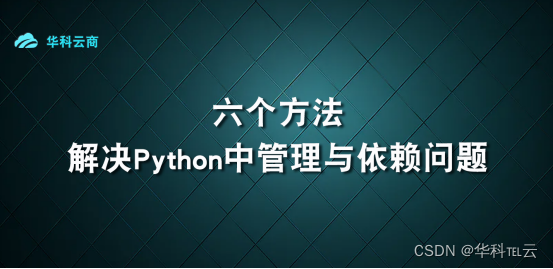
In Python development, package management and dependency issues have always been one of the headaches for developers. As projects grow in size and complexity, managing various dependency packages and resolving version conflicts becomes particularly important. This article will share methods and tools for solving package management and dependency issues in Python, helping developers better manage dependencies in projects and improve development efficiency.
1. Understand the importance of package management and dependencies
Package management and dependencies mean that in Python projects, we use third-party libraries or modules to extend functions or solve problems. These external libraries are usually packaged into packages and have dependencies on other packages. During the development process, it is necessary to manage the versions, installations and updates of these packages, as well as resolve possible version conflicts.
2. Use virtual environments for package management
Virtual environments are one of the common ways for Python to solve dependency problems. A virtual environment can create an independent Python running environment in which required packages can be installed, managed, and upgraded without affecting other Python environments in the system. Virtual environments can be created and managed using Python's built-in venv module or third-party tools such as virtualenv.
3. Use package management tools
Python provides a powerful package management tool, pip, which can easily install, upgrade and delete packages. You can use pip to manage project dependencies, such as installing specified versions of packages, upgrading all or specified packages, freezing the dependencies of the current environment into a configuration file, etc. In addition, there are some third-party package management tools such as pipenv and poetry, which provide more advanced features, such as automated dependency resolution, locked versions, management of environment variables, etc.
4. Use dependency management tools
Usually, the dependencies of a Python project are complex, involving multiple packages and versions. To better manage these dependencies, dependency management tools can be used to parse and manage dependencies. For example, you can use the requirements.txt file provided by pip to list the project's dependent packages and versions; or use third-party tools such as pip-tools and poetry to automatically parse and manage complex dependencies.
5. Pay attention to version conflicts and compatibility
When using Python's package management and dependency tools, you need to pay attention to version conflicts and compatibility issues. Different packages may have different version requirements. If the versions are incompatible, it may cause code running errors. Therefore, version conflicts in dependencies should be carefully checked and resolved to ensure the stability and reliability of the project.
6. Continuously learn and update knowledge
Python's package management and dependency issues are an area that is constantly growing and changing. As new tools and technologies emerge, methods for solving dependency problems are constantly being updated. As a developer, you need to continue to learn and update your knowledge, and pay attention to the latest package management and dependency solutions to adapt to the changing development environment.
This article shares methods and tools for solving package management and dependency issues in Python. Virtual environments, package management tools, and dependency management tools are commonly used tools to solve dependency problems. They can help developers better manage dependencies in projects and improve development efficiency. When using these tools, you also need to pay attention to version conflicts and compatibility issues, and continue to learn and update knowledge.
I hope this article will help you solve the package management and dependency issues in Python, and provide guidance and support for you to better manage project dependencies during the development process. Let us study and practice in depth together to continuously improve our technical level!